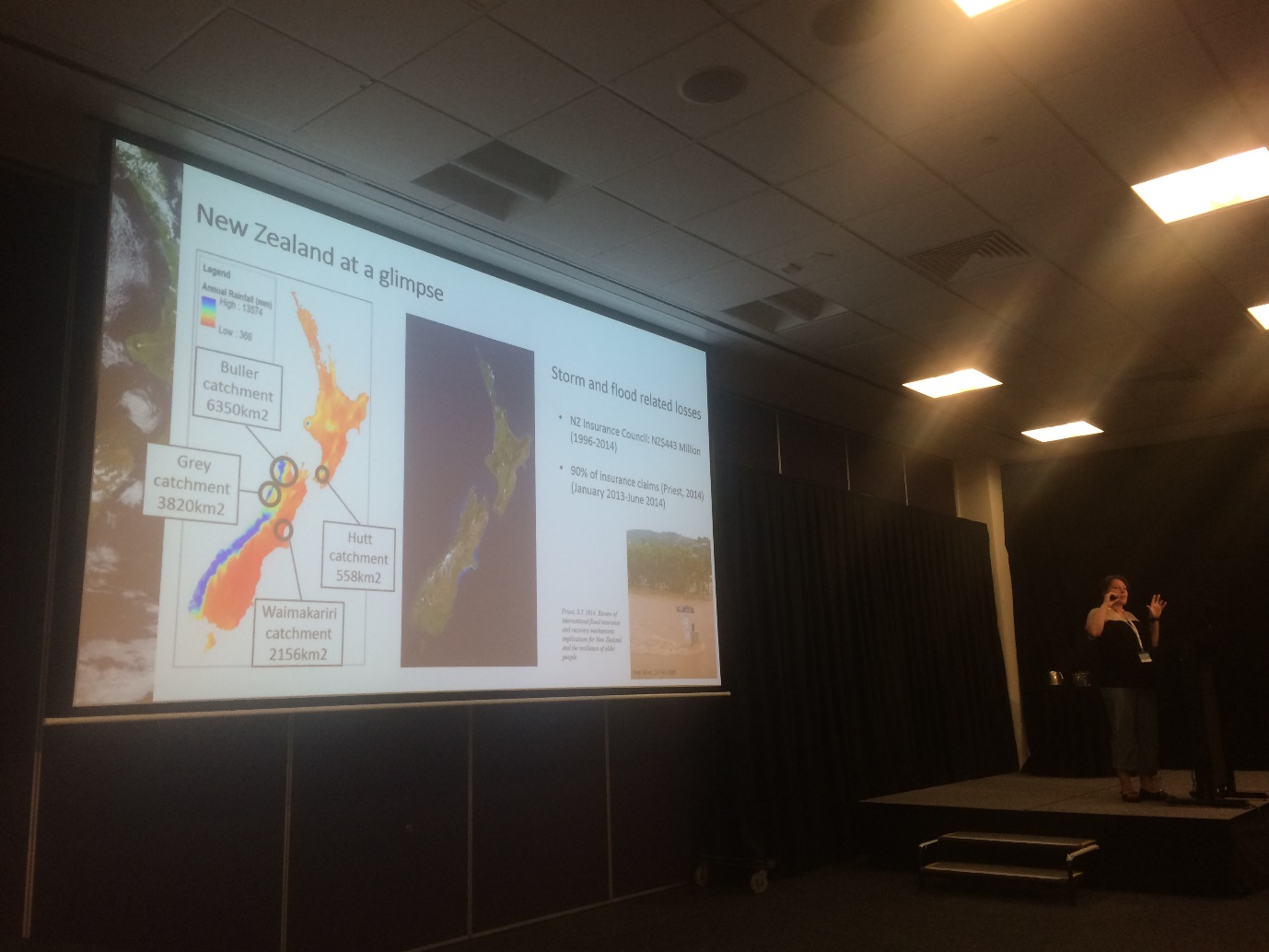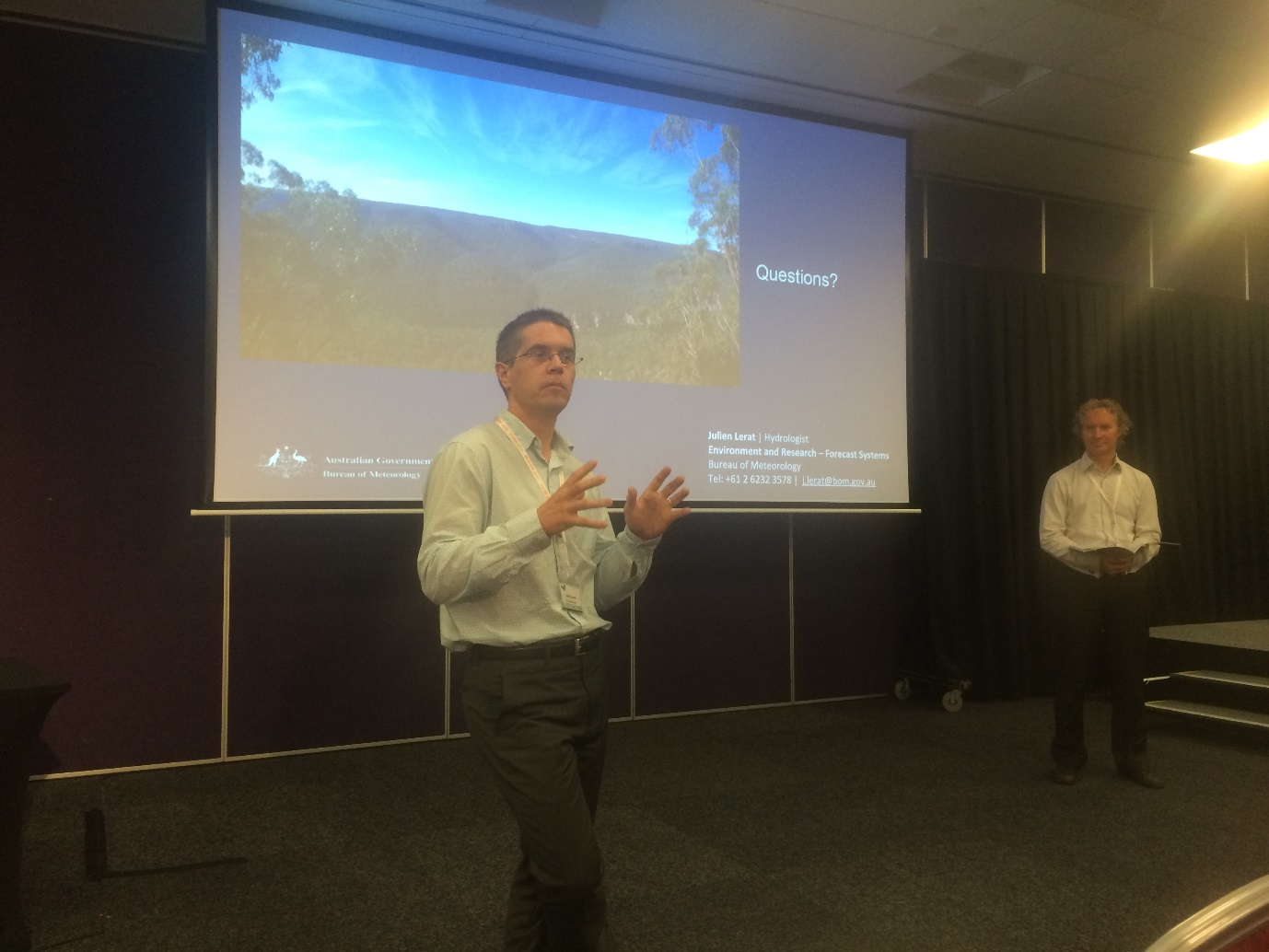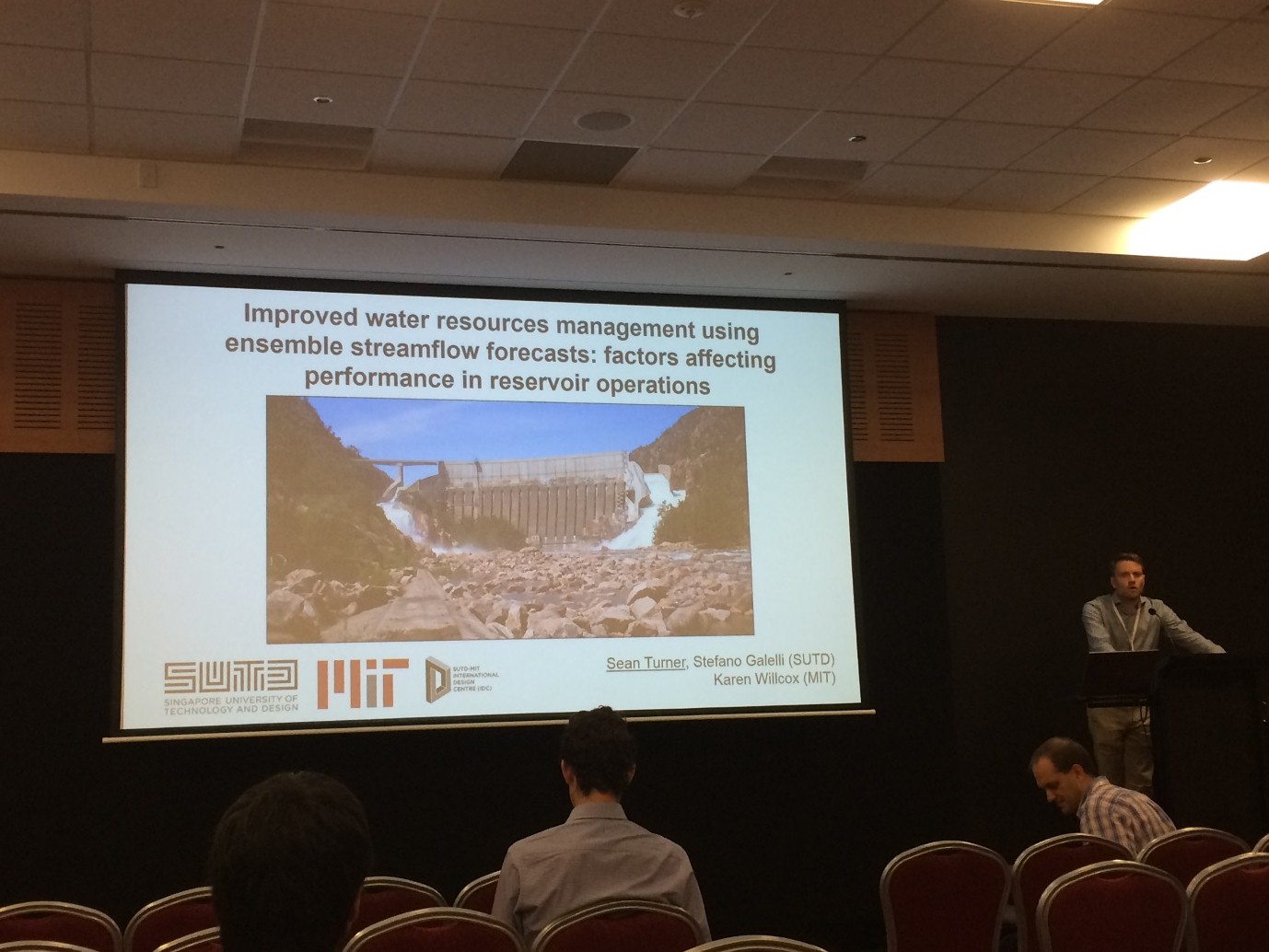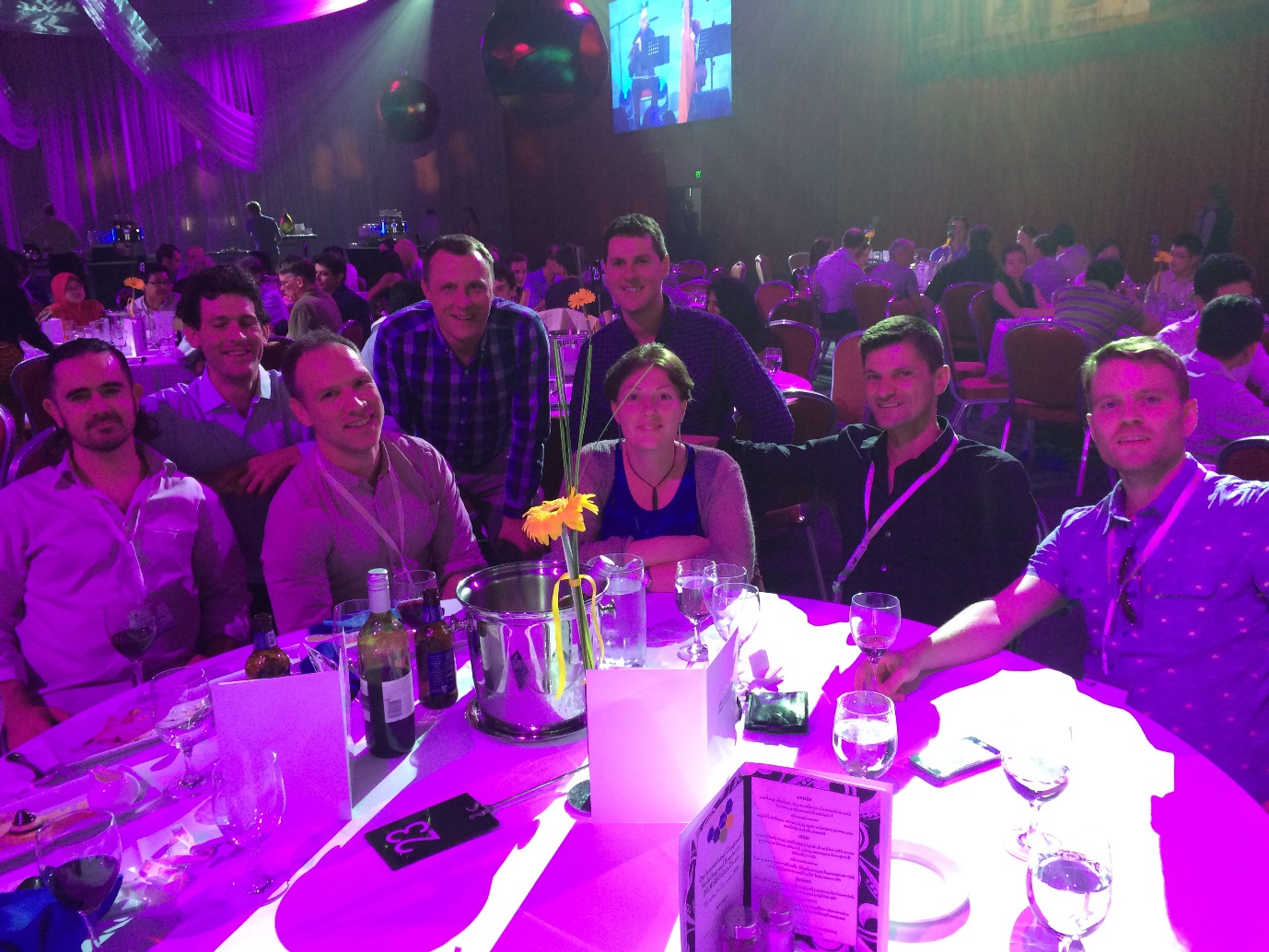Feedback on HEPEX sessions at the MODSIM2015 conference
Contributed by James Bennett (CSIRO), Sean Turner (Singapore University of Technology and Design), David Robertson (CSIRO), Lucy Marshall (UNSW)
Sunday November 30, 17:00: preposterously muscled men and women, luminescent in orange spray-on tans and micro singlets, descended on the convention centre for the commencement of MODSIM2015.
This might ordinarily be cause for cognitive dissonance [1], but we were on the Gold Coast: Australia’s playground (or at least, its sandpit). If you like your beaches glorious, your hotels high-rise and your trees to be Norfolk Island pines (we know what you’re thinking… “do you mean there are other kinds of tree?”), then welcome home.
Our home for the next 5 days was the MODSIM2015 conference, the bi-annual conference of the Australia and New Zealand modelling and simulation society.
MODSIM attracts over 700 delegates from all walks of simulation and modelling, ranging from defence systems to econometrics and with plenty of hydrology, climate and ecosystem modelling in between.
Céline Cattoën (NIWA) on her efforts to use very high-resolution NWP forecasts to generate ensemble streamflow forecasts in New Zealand.
This year, for the first time, it was attracting the ensemble forecasting community to two HEPEX-affiliated sessions: Advances in rainfall and streamflow forecasts, and Water Resources Management informed by hydroclimatic forecasts.
Operational forecasters and forecast researchers came from Japan, New Zealand, Germany, Singapore, China, and, of course, Australia to present and discuss ideas.
The session on Advances in rainfall and streamflow forecasts ran all day on the Tuesday. Topics ranged from improving the reliability of coupled model forecasting systems through operational streamflow forecasting systems to improving ensemble forecast verification. A number of presenters noted the upcoming change in operational seasonal coupled forecasts run by the Bureau of Meteorology for Australia, and the implications for seasonal hydrological forecasting (the Bureau will soon run the ACCESS-S model, based on the UK Met Office’s seasonal forecasting system).
A talk by former HEPEX columnist Tom Pagano (Bureau of Meteorology) on the difficulties and benefits of combining human expertise and automation in flood forecasting generated a large amount of discussion. Papers for this session can be found here under session L4.
Julien Lerat (Bureau of Meteorology) answers questions on merging seasonal streamflow forecasts to take advantage of complementary skill of different forecasts.
The Friday session on Water resources management informed by hydroclimatic forecasts featured an interesting mix of presentations from both researchers and practitioners.
Several talks discussed extending ensemble forecasting to hydrological variables other than just streamflow, including soil moisture and water quality, to satisfy the needs of water managers.
Paul Feikema of the Bureau of Meteorology discussed the pivotal importance of having regular discussions with users of forecasts to improve seasonal forecasting services. Paul provided a nice case example of a water utility that had adopted the forecasts to support a risk-based operating decision—with a positive outcome.
Sean Turner (Singapore University of Technology and Design) introduced his Model Predictive Control method for implementing ensemble forecasts in reservoir operating schemes. He used CSIRO’s Forecast Guided Stochastic Scenarios (FoGSS) ensemble seasonal streamflow forecasting system to demonstrate significant performance gains over conventional operations.
The main takeaways from the presentations and subsequent discussions were:
- There is significant scope for expanding the science of hydroclimatic forecasting into new fields, including water quality prediction and operations research.
- There is clear scope for improved management and operation of water for agricultural, municipal and environmental purposes if forecasts can be more widely adopted in practice.
- There remain substantial challenges for bridging the gap between producing forecasts and making them operational in water resources management. Perhaps the main challenge is making use of the probabilistic nature of state-of-the-art forecast products to inform risk-based decisions.
Papers for this session can be found here, under session L15.
Forecasters at the MODSIM2015 dinner. L-R: Andrew Charles, Kim Robinson, James Bennett, Paul Feikema, Andrew Schepen, Céline Cattoën, Jean-Michel Perraud, Sean Turner.
Other activities
MODSIM had a rest day on Wednesday, allowing enthusiastic forecasters to attend the Ozewex Workshop for the session on streamflow forecasting. Several others decided to take some time to enjoy the beach nearby, and a few brave forecasters chanced their arm (and probably other limbs) in the thumping surf. Fatalities: 0 (Take that jellyfish/bull sharks/surf-of-doom).
The forecasters cemented new acquaintances and renewed old ones at dinner after the Tuesday session and at the conference dinner on Thursday night.
Overall, the inclusion of HEPEX sessions at MODSIM2015 provided an excellent chance to get to meet operational forecasters and forecasting researchers from Oceania and beyond, and we hope to make them a permanent fixture in future MODSIM conferences.
[1] It’s possible that some of these hulking men and women were attending the body-building conference that cohabited the convention centre with MODSIM, but as we were too intimidated to speak to any of them we would be failing in our scientific duty if we offered hard conclusions on the matter.




February 3, 2016 at 12:53
Hello,
Thank you for this interesting feedback.
The link to the papers of the session dedicated to the difficulties and benefits of combining human expertise and automation in flood forecasting, does not seem to work properly (404). May you check the address, please ?
February 3, 2016 at 13:00
Thank you, Lionel. I have just corrected it. It is now working: http://www.mssanz.org.au/modsim2015/papersbysession.html (under session L4)
February 11, 2016 at 12:10
If you want to look at my slides about expertise and automation they are at https://www.dropbox.com/s/mllsszn3o9482yz/Pagano_Automation_Expertise_201512_v5.pptx?dl=0
Parts of this are based on a paper that has been submitted at https://www.dropbox.com/s/xnvxpe2zemk0ngr/Roles%20of%20Expertise%20and%20Automation%20in%20Operational%20River%20Forecasting_v20.docm?dl=0
February 11, 2016 at 17:15
Appreciate the nice, funny writing as well as the summary — thanks James & coauthors!